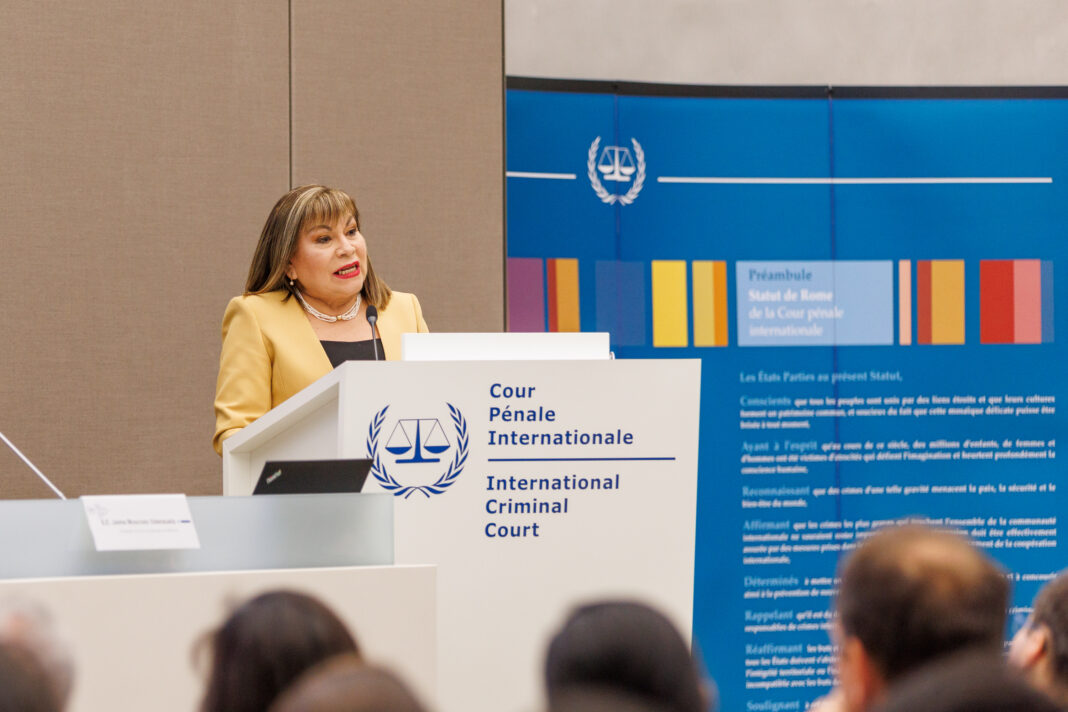On 7 June 2023, the Opening Ceremony of the 10th Ibero-American Week of International Justice in The Hague (“the Week”) co-organized by the Ibero-American Institute of The Hague (IIH) and the International Criminal Court (ICC or Court) was held at ICC headquarters. The Week is an annual academic event that has consolidated itself as a benchmark event in Spanish in the field of international law. Due to the pandemic, the Week had not been held in person since 2019.
The Opening Ceremony, which in previous editions was held at the International Court of Justice (ICJ) took place in Spanish in its entirety. The event, enlivened with live music financed by the Embassy of Spain, was attended by about 150 persons: representatives of States, international organizations, Latin American students, professors, judges and prosecutors, and members of civil society committed to the importance of both the influence of Spanish and the Ibero-American tradition in international justice.
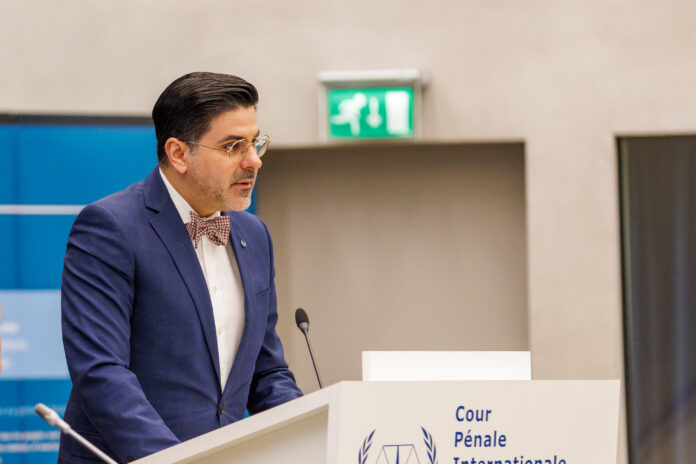
As the host, the ICC Registrar, H.E. Mr. Osvaldo Zavala Giler, opened the Ceremony: “As the first Latin American Registrar of the ICC, it is an honor and a pride to host the Opening Ceremony of the 10th Ibero-American Week of International Justice for the first time at the ICC.” The Registrar recalled that the Court has been supporting the activities of the week consistently during 10 years and highlighted the role of Latin American academia in the development, implementation and support of the system created by the Rome Statute.
Attendees also listened to the words of Dr. Hector Olasolo, President of the IIH and Professor at the Universidad del Rosario (Colombia) who promoted and has coordinated the activities of the Week throughout this decade. “There are many people that have made it possible for the Ibero-American Week to have acquired the form and content that it presents today,” said Professor Olasolo, thanking, among others, the host state and the embassies of the Ibero-American countries for their support. “Their support, and provision of their facilities, has allowed us to consolidate, in this magnificent City of The Hague, a multicultural project such as Ibero-American Week, which is the best proof of the universal scope of international justice, and of the City of The Hague as its epicenter.”
This intervention was followed by that of Dr. Cristina Hoss, Legal Officer of the International Court of Justice (ICJ), who represented H.E. Mr. Philippe Gautier, Registrar of the ICJ and conveyed his remarks. In her speech, she recalled “the legacy of Ibero-American thought and legal traditions not only in international law, but also within the International Court of Justice” and reflected on “the future of Ibero-American legal thought and culture in today’s world – tormented by several international challenges”.
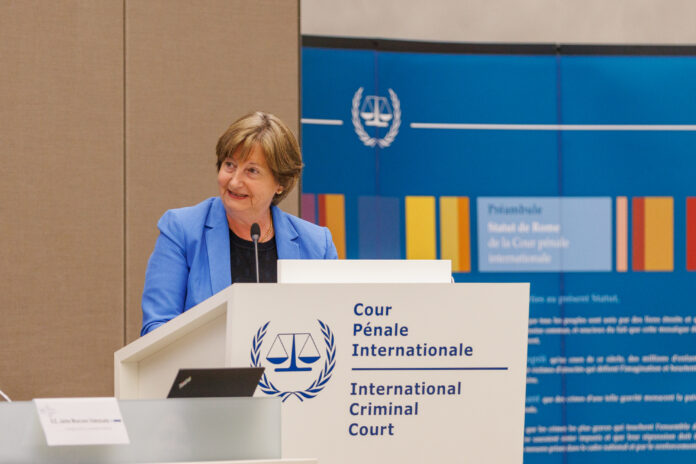
H.E. Ms. Silvia Fernández de Gurmendi, President of the Assembly of States Parties to the ICC, stressed in her speech: “This week, which consistently brings together Ibero-American states, is very important to strengthen the underlying values of the International Criminal Court. The universal aspiration of the Rome Statute system rests on respect for the diversity of regions and legal systems. Ibero-American countries have come together to promote their traditions, values and interests and, in doing so, they have contributed to furthering the global objectives of the Court and strengthening cooperation with its activities”.
This was followed by the intervention of H.E. Henk Cor van der Kwast, Ambassador of the Netherlands to the ICC and OPCW, who stated: “The Kingdom of the Netherlands firmly believes in promoting respect for international law and strengthening the rules-based international order (…). Your region and our Kingdom already have a strong record of cooperation in multilateral forums, and we continue to work on the development of the international legal order.”
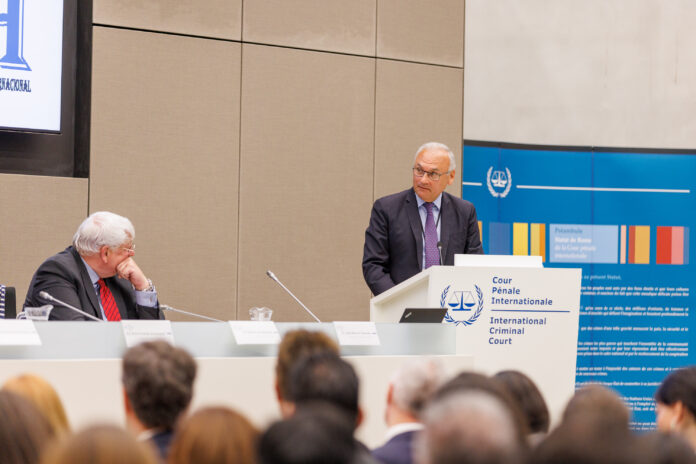
For his part, H.E. Jaime Moscoso Valenzuela, Ambassador of Chile to the Netherlands and current Coordinator of the Latin American and Caribbean Group (GRULAC), highlighted “the vitality of the Spanish language in the international legal context and the collective strength of Spanish-speaking countries in making its use visible and generalized”. Ambassador Moscoso reminded the crucial contribution of the countries of the region to the field of international Law, Human Rights and transitional Justice. “This reality encourages us to continue proposing that the use of Spanish be considered as a valid language for the pursuit of international justice and, therefore, that it be recognized in the statutes of the courts and tribunals,” he added.
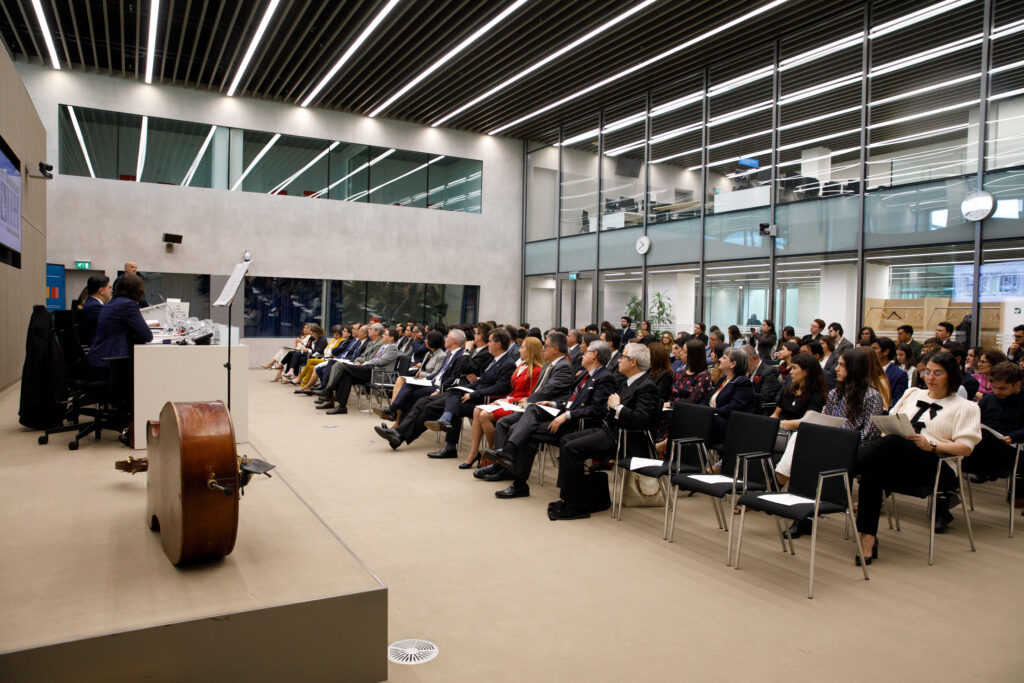
H.E. Judge Luz Ibáñez Carranza, ICC’s First Vice-President, was the keynote speaker with her speech on the centrality of human rights in the field of international criminal justice : “The international criminal justice system of this Court is increasingly committed to the centrality of human rights. This task has never been easy and initially faced considerable resistance, as it was believed that only criminal or public international law criteria should be applied. Fortunately, this situation is changing and evolving, with an increasing consideration of human rights at stake. That is why it is important, that you young people, who have attended this great meeting and come from different parts of Latin America and the Iberian Peninsula, internalize the great battle that international justice has to fight and your great responsibility in the face of the values that sustain us as humanity that are consolidated in the current human rights.”
The 10th Ibero-American Week of International Justice provided a unique and enriching atmosphere for Spanish speakers with different academic activities, presentations of publications, seminars and discussions that took place at the headquarters of several Embassies, the ICC and the Hague University for Applied Sciences.
During the Week, in addition to the 8th Seminar on Ibero-American Thought, the preliminary hearings of the 10th Edition Spanish version of the ICC Moot Court Competition were held. These took place for the first time in person after the pandemic. They gathered 58 students from 11 Latin American countries. The final round took place on 7 June 2023 in the afternoon, also at the ICC headquarters. On the judge’s bench for this competition were ICC Vice-President Luz del Carmen Ibáñez Carranza, Judge Socorro Flores Liera and Judge Sergio Ugalde Godínez.
The National Autonomous University of Mexico (UNAM) won the competition. The University of Buenos Aires (Argentina) and the University of Nariño (Colombia) won, respectively, second and third places. The award for the Best Speaker went to Julieta Valentina Ricagno of the University of Buenos Aires.

